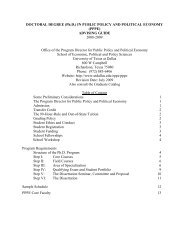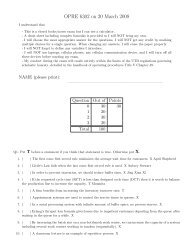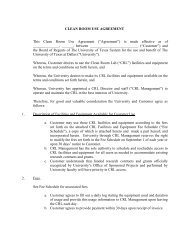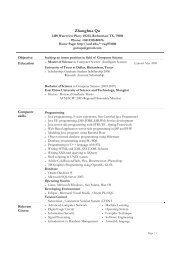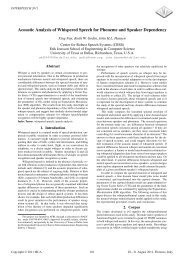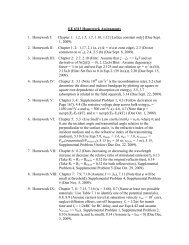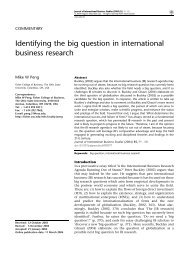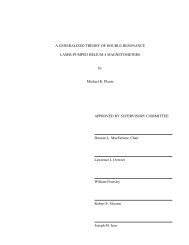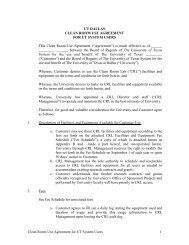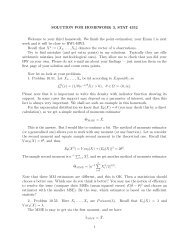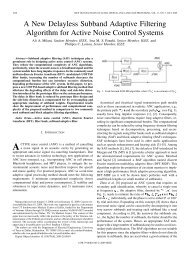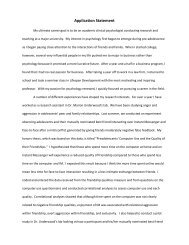Behind Intermediary Performance in Export Trade - The University of ...
Behind Intermediary Performance in Export Trade - The University of ...
Behind Intermediary Performance in Export Trade - The University of ...
You also want an ePaper? Increase the reach of your titles
YUMPU automatically turns print PDFs into web optimized ePapers that Google loves.
INTERMEDIARY PERFORMANCE IN EXPORT TRADE<br />
research concentrates on the manufacturers’<br />
standpo<strong>in</strong>t, we directly answer<br />
the important but unexplored question<br />
raised by Peng and Il<strong>in</strong>itch (1998, p.<br />
615), “What determ<strong>in</strong>es the performance<br />
<strong>of</strong> export <strong>in</strong>termediary firms?” We found<br />
that <strong>in</strong>termediaries’ performance not<br />
only depends on their ability to provide<br />
knowledge-based search and negotiation<br />
services more efficiently, but also depends<br />
on the outcome- and/or behavioral-based<br />
signals they send to exporters.<br />
<strong>The</strong>se signals can help exporters<br />
identify honest and capable <strong>in</strong>termediaries<br />
from those who are likely to be opportunistic<br />
and <strong>in</strong>capable. While our<br />
study focuses on the <strong>in</strong>termediaries’<br />
standpo<strong>in</strong>t, it is also important to exporters,<br />
because the results show that <strong>in</strong>termediaries<br />
may fare best when they keep<br />
exporters’ <strong>in</strong>terests <strong>in</strong> m<strong>in</strong>d.<br />
Overall, our contributions lie <strong>in</strong> the<br />
theoretical <strong>in</strong>tegration <strong>of</strong> transaction<br />
cost, agency, and resource-based theories<br />
grounded <strong>in</strong> the context <strong>of</strong> export<br />
trade, and the empirical answer <strong>of</strong> the<br />
previously unexplored question <strong>of</strong> export<br />
<strong>in</strong>termediary performance raised by<br />
Peng and Il<strong>in</strong>itch (1998).<br />
Practical Implications<br />
Current and would-be export <strong>in</strong>termediaries<br />
can benefit from this study, accord<strong>in</strong>g<br />
to an editorial <strong>of</strong> the <strong>Export</strong>er<br />
magaz<strong>in</strong>e which featured our results<br />
(Stroh, 1996). Hard-to-imitate resources,<br />
such as export knowledge and f<strong>in</strong>ancial<br />
abilities, appear to be key factors beh<strong>in</strong>d<br />
export <strong>in</strong>termediary success, although<br />
develop<strong>in</strong>g such resources takes a long<br />
time. Intermediaries without substantial<br />
export experience and f<strong>in</strong>ancial strength<br />
could face a severe disadvantage. Similarly,<br />
our results suggest that <strong>in</strong>termediaries<br />
should focus on relatively simple,<br />
commodity products rather than high-<br />
tech, differentiated products. <strong>The</strong> odds<br />
aga<strong>in</strong>st <strong>in</strong>termediaries who specialize <strong>in</strong><br />
complex products seem to be significant.<br />
On the other hand, focus<strong>in</strong>g on commodity<br />
products does not have to be “bor<strong>in</strong>g”<br />
and can be equally “excit<strong>in</strong>g.” Given<br />
the extensive <strong>in</strong>formation asymmetries<br />
across different countries, well-known<br />
commodity products <strong>in</strong> one country may<br />
be differentiated <strong>of</strong>fer<strong>in</strong>gs command<strong>in</strong>g<br />
premium <strong>in</strong> another country, thus present<strong>in</strong>g<br />
market discovery opportunities<br />
for entrepreneurial <strong>in</strong>termediaries.<br />
F<strong>in</strong>ally, manufactur<strong>in</strong>g executives and<br />
policymakers may benefit from our f<strong>in</strong>d<strong>in</strong>gs.<br />
Know<strong>in</strong>g what determ<strong>in</strong>es the performance<br />
<strong>of</strong> export <strong>in</strong>termediaries will<br />
help make the <strong>in</strong>termediary selection<br />
process less risky. In particular, while<br />
<strong>in</strong>termediaries’ search and negotiation<br />
abilities may be difficult to verify (other<br />
than exam<strong>in</strong><strong>in</strong>g their track record),<br />
whether they are will<strong>in</strong>g to take title and<br />
specialize <strong>in</strong> commodity products is<br />
much more observable for exporters. For<br />
government export promotion agencies,<br />
more attention to the f<strong>in</strong>anc<strong>in</strong>g needs <strong>of</strong><br />
<strong>in</strong>termediaries seems urgently warranted,<br />
<strong>in</strong> light <strong>of</strong> the importance <strong>of</strong> <strong>in</strong>termediaries’<br />
ability to tak<strong>in</strong>g title to<br />
goods.<br />
Limitations and Future<br />
Directions<br />
<strong>The</strong> first limitation <strong>of</strong> this study is that<br />
it is empirically difficult to demonstrate<br />
whether the pr<strong>in</strong>cipal’s export performance<br />
is actually improved by employ<strong>in</strong>g<br />
<strong>in</strong>termediaries. It orig<strong>in</strong>ates from the<br />
well-known transaction cost paradox <strong>of</strong><br />
try<strong>in</strong>g to impute performance implications<br />
from observed governance choices<br />
(e.g., <strong>in</strong>direct export), whereby the performance<br />
from the unchosen governance<br />
choice (e.g., direct export) is, by def<strong>in</strong>ition,<br />
unknown (Masten, 1993). Future<br />
340 JOURNAL OF INTERNATIONAL BUSINESS STUDIES



